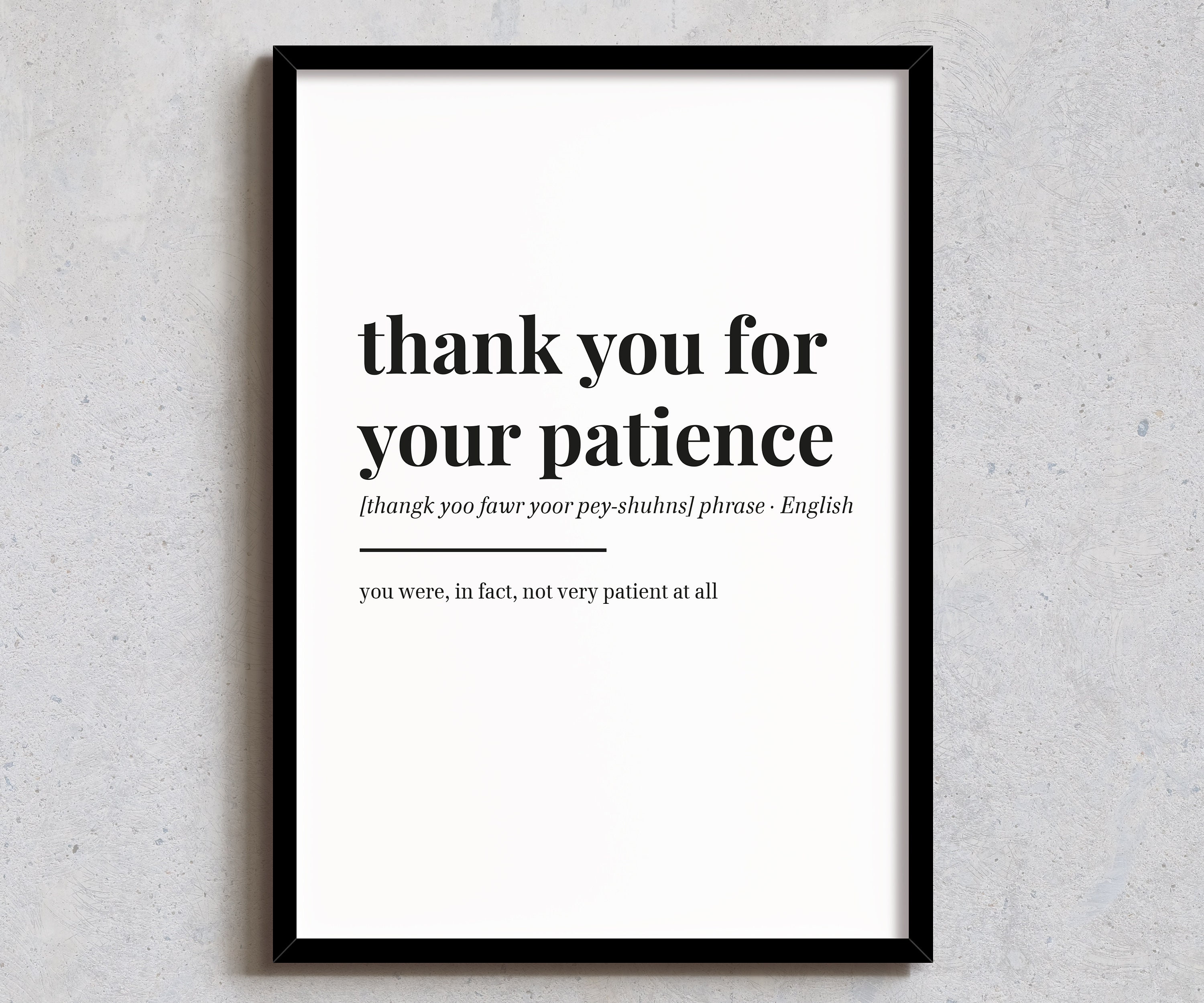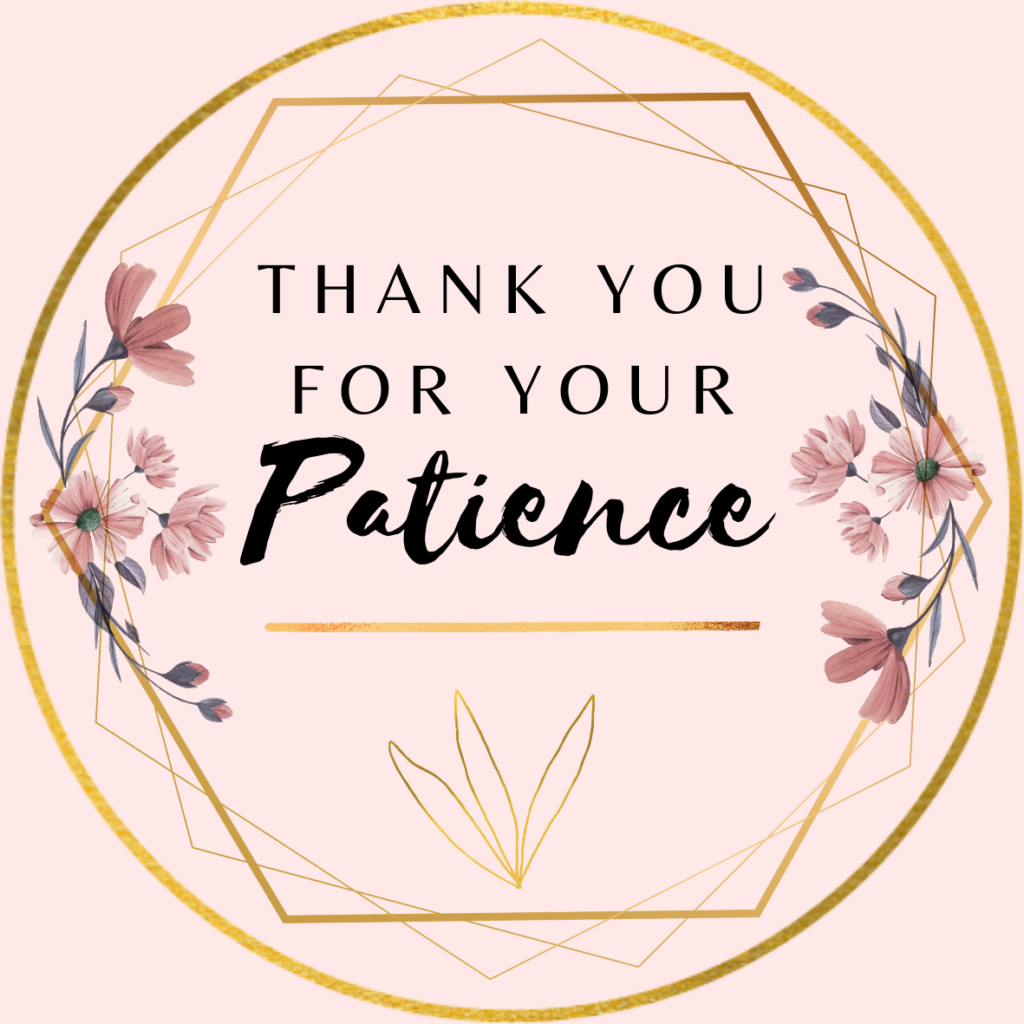Thank you for your patience. We appreciate your understanding during this time.
Patience is a virtue that often gets overlooked in our fast-paced world. In business and personal interactions, patience can be a game-changer. Whether you’re waiting for a service or dealing with delays, staying calm makes a difference. It shows respect and understanding, fostering better relationships.
Companies value patient customers and often provide better support. Patience also helps in making thoughtful decisions. It reduces stress and promotes a more positive atmosphere. Practicing patience can lead to improved outcomes in various aspects of life. This article explores the importance of patience and how it benefits both individuals and organizations.
Importance Of Patience
Patience is a key virtue in our everyday lives. It helps us handle challenges calmly. When we say “Thank you for your patience,” we acknowledge someone’s understanding and tolerance. This gesture fosters better relationships and smoother interactions.
Foundation Of Trust
Trust is built on patience. Waiting patiently shows respect and care. When people are patient, they show reliability. This makes others feel safe and valued. Here are some ways patience builds trust:
- Listening without interrupting
- Allowing time for thoughtful responses
- Respecting others’ pace and needs
Enhancing Communication
Effective communication relies on patience. Waiting your turn to speak helps everyone feel heard. Patience also allows for better understanding. People can think clearly without rush. This leads to fewer misunderstandings. Consider these points:
- Pause before responding
- Give others time to explain
- Stay calm during discussions
| Patience Benefits | Impact |
|---|---|
| Reduces Stress | Calmer interactions |
| Builds Trust | Stronger relationships |
| Improves Communication | Clearer understanding |
Patience In Personal Relationships
Patience is a vital quality in personal relationships. It builds trust and understanding. It helps maintain harmony and resolve issues. Let’s explore how patience can enhance our bonds and resolve conflicts.
Strengthening Bonds
Patience helps in strengthening bonds with loved ones. It shows we care and understand. By being patient, we listen better and respond thoughtfully. This makes our relationships stronger and more fulfilling.
- Improves Communication: Patience helps us listen carefully and speak kindly.
- Builds Trust: When we are patient, others feel valued and respected.
- Encourages Empathy: Patience allows us to understand others’ feelings and perspectives.
Resolving Conflicts
Conflicts are a part of every relationship. Patience plays a crucial role in resolving them. It helps us stay calm and think clearly. This way, we can find solutions that are fair for everyone involved.
- Stay Calm: Patience keeps us from reacting impulsively during conflicts.
- Think Clearly: With patience, we can analyze the situation better.
- Find Fair Solutions: Patience helps us reach agreements that satisfy all parties.
Patience in personal relationships is essential. It strengthens bonds and resolves conflicts effectively. By practicing patience, we can create more harmonious and lasting relationships.
Patience In Professional Settings
Patience is a vital skill in professional settings. It helps create a calm and productive work environment. By being patient, employees can handle stress better and make thoughtful decisions.
This section explores how patience fosters teamwork and improves leadership.
Fostering Teamwork
Patience is crucial in fostering teamwork. It allows team members to understand each other’s viewpoints. This understanding leads to better collaboration and problem-solving.
- Enhanced Communication: Patience encourages open dialogue.
- Conflict Resolution: Patience helps resolve disagreements calmly.
- Trust Building: Patience builds trust among team members.
Teams that practice patience show higher productivity. They also have a more positive work atmosphere.
Improving Leadership
Effective leaders demonstrate patience. It allows them to listen and understand their team’s needs. This understanding is crucial for making informed decisions.
- Better Decision Making: Patience leads to thoughtful choices.
- Empathy: Patient leaders show empathy towards their team.
- Mentorship: Patience helps in guiding and mentoring others.
Leaders who practice patience inspire their teams. They also create an environment of mutual respect.
| Benefits of Patience | Impact on Team |
|---|---|
| Enhanced Communication | Open and honest dialogue |
| Conflict Resolution | Calm and effective solutions |
| Trust Building | Stronger team bonds |
| Better Decision Making | Informed and wise choices |
| Empathy | Understanding team needs |
| Mentorship | Guiding and teaching |
Developing Patience
Developing patience is a skill that benefits everyone. Patience helps us deal with challenges calmly. It allows us to make better decisions. Let’s explore techniques to develop patience effectively.
Mindfulness Techniques
Mindfulness helps us stay present in the moment. It reduces stress and anxiety. Here are some mindfulness techniques to practice:
- Deep Breathing: Take slow, deep breaths. Focus on your breathing.
- Body Scan: Pay attention to different parts of your body. Relax each part.
- Meditation: Sit quietly and focus on a single thought or object. Let other thoughts pass by.
Setting Realistic Expectations
Setting realistic expectations helps manage frustration. It keeps us grounded in reality. Here are ways to set realistic expectations:
- Know Your Limits: Understand what you can and cannot do. This prevents overcommitting.
- Break Tasks: Divide large tasks into smaller, manageable steps. This makes them less overwhelming.
- Be Flexible: Accept that things may not always go as planned. Adapt to changes easily.
Benefits Of Patience
Patience is a valuable virtue. It offers numerous benefits in our daily lives. From emotional stability to making better decisions, patience plays a crucial role.
Emotional Well-being
Patience significantly boosts emotional well-being. It helps reduce stress and anxiety. When you are patient, you are less likely to feel frustrated. This leads to a calmer and more peaceful mind.
Here are some ways patience impacts emotional well-being:
- Reduces anger and frustration
- Enhances mood stability
- Improves overall happiness
Better Decision Making
Patience also aids in better decision making. It allows you to think things through. This means you can make more informed decisions.
Benefits of patience in decision making include:
| Benefit | Description |
|---|---|
| Clarity | Patience provides a clear mind to analyze options. |
| Reduced Errors | Less haste means fewer mistakes. |
| Confidence | Patience builds confidence in your choices. |
In conclusion, patience is essential for a balanced and successful life.

Challenges To Patience
Patience is a virtue, but it is not easy to practice. Many face challenges to patience every day. These challenges can test our limits and make us feel frustrated. Let’s explore some common challenges to patience and how to overcome them.
Dealing With Frustration
Frustration often comes when things do not go as planned. This can happen at work, home, or even during daily tasks.
Here are some tips to deal with frustration:
- Take deep breaths – Breathing deeply can help calm your mind.
- Step away – Sometimes a short break can give you a new perspective.
- Talk it out – Sharing your feelings with someone can ease your burden.
Overcoming Impatience
Impatience often leads to hasty decisions and mistakes. It is important to learn how to overcome impatience.
Consider these strategies:
- Set realistic expectations – Understand that good things take time.
- Practice mindfulness – Stay present and appreciate the moment.
- Stay positive – Focus on the good things around you.
Here is a comparison table to illustrate the impact of patience and impatience:
| Patience | Impatience |
|---|---|
| Leads to better decisions | Causes hasty mistakes |
| Reduces stress | Increases anxiety |
| Builds stronger relationships | Creates conflicts |
Patience And Empathy
Patience is a virtue that many aspire to have. When paired with empathy, it becomes a powerful tool. This combination helps us understand and connect with others. It fosters strong relationships and builds trust. Below, we explore how patience and empathy work together.
Understanding Others
Understanding others starts with patience. By waiting and listening, we learn more about their feelings. This helps us to see things from their perspective. It can make a big difference in how we interact.
Here are some ways to practice patience and understand others better:
- Take deep breaths before reacting.
- Listen without interrupting.
- Ask open-ended questions.
Building Compassion
Building compassion requires empathy. When we empathize, we feel what others feel. This connection helps us to be kind and supportive. Patience allows us to take the time to understand their struggles.
Steps to build compassion include:
- Practicing active listening.
- Offering help where needed.
- Expressing genuine concern.
| Patience | Empathy |
|---|---|
| Waiting calmly | Understanding feelings |
| Listening actively | Showing compassion |
| Taking deep breaths | Being supportive |
By combining patience and empathy, we can build stronger relationships. These qualities help us to connect on a deeper level.

Practical Tips For Cultivating Patience
Learning to be patient can change your life. Patience helps you manage stress and stay calm. Here are some practical tips for cultivating patience.
Daily Practices
Patience is a skill you can practice every day. Here are some daily habits to help you:
- Deep Breathing: Take deep breaths to calm yourself.
- Mindfulness: Focus on the present moment.
- Positive Self-Talk: Use encouraging words when stressed.
- Time Management: Plan your day to avoid rushing.
- Gratitude: Think about things you are thankful for.
Long-term Strategies
For lasting patience, try these long-term strategies:
- Meditation: Meditate regularly to improve your focus.
- Journaling: Write about your feelings to understand them better.
- Exercise: Regular physical activity reduces stress.
- Healthy Diet: Eat balanced meals to keep your energy stable.
- Set Goals: Create realistic goals and work steadily towards them.

Frequently Asked Questions
What Does “thank You For Your Patience” Mean?
“Thank you for your patience” expresses gratitude for someone’s understanding and tolerance during a delay or inconvenience.
When Should I Say “thank You For Your Patience”?
Use it when someone waits calmly for a service or during unavoidable delays.
Is “thank You For Your Patience” Professional?
Yes, it’s a professional and polite way to acknowledge someone’s understanding during a wait.
How To Respond To “thank You For Your Patience”?
Respond with “You’re welcome” or “No problem” to acknowledge their gratitude.
Conclusion
Your patience means a lot to us. We appreciate your understanding during this time. Thank you for being a valued part of our community. Stay tuned for more updates and improvements. Your continued support helps us grow and serve you better.
We look forward to providing you with exceptional service.

Leave a Reply
You must be logged in to post a comment.